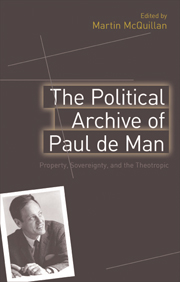Book contents
- Frontmatter
- Contents
- List of Abbreviations
- Acknowledgements
- Notes on Contributors
- Introduction: Broken Promises: Rousseau, de Man and Watergate
- 1 Lovence in Rousseau's Julie ou la Nouvelle Héloïse
- 2 Reading Spectacles in Rousseau's Letter to d'Alembert
- 3 The Utter Misery of the Human Mind: Apotropaic and Theotropic in de Man's Rousseau
- 4 Rhetoric and Rausch: de Man on Nietzsche on Value and Style
- 5 Theotropic Logology: J. Hillis Miller, Paul de Man and Kenneth Burke
- 6 Normativity, Materiality and Inequality: The Politics of the Letter in Paul de Man
- 7 Inscribing the Political: Paul de Man and the Wild Art of Letter Writing
- 8 Mistake in Paul de Man: Violent Reading and Theotropic Violence
- 9 Lightstruck: ‘Hegel on the Sublime’
- 10 De Man vs. ‘Deconstruction’: or, Who, Today, Speaks for the Anthropocene?
- 11 Paul de Man at Work: What Good is an Archive?
- 12 DNA: de Man's Nucleic Archive
- 13 Sovereign Debt Crisis: Paul de Man and the Privatization of Thought
- Appendix: Nietzsche I: Rhetoric + Metaphysics
- Index
4 - Rhetoric and Rausch: de Man on Nietzsche on Value and Style
Published online by Cambridge University Press: 05 August 2013
- Frontmatter
- Contents
- List of Abbreviations
- Acknowledgements
- Notes on Contributors
- Introduction: Broken Promises: Rousseau, de Man and Watergate
- 1 Lovence in Rousseau's Julie ou la Nouvelle Héloïse
- 2 Reading Spectacles in Rousseau's Letter to d'Alembert
- 3 The Utter Misery of the Human Mind: Apotropaic and Theotropic in de Man's Rousseau
- 4 Rhetoric and Rausch: de Man on Nietzsche on Value and Style
- 5 Theotropic Logology: J. Hillis Miller, Paul de Man and Kenneth Burke
- 6 Normativity, Materiality and Inequality: The Politics of the Letter in Paul de Man
- 7 Inscribing the Political: Paul de Man and the Wild Art of Letter Writing
- 8 Mistake in Paul de Man: Violent Reading and Theotropic Violence
- 9 Lightstruck: ‘Hegel on the Sublime’
- 10 De Man vs. ‘Deconstruction’: or, Who, Today, Speaks for the Anthropocene?
- 11 Paul de Man at Work: What Good is an Archive?
- 12 DNA: de Man's Nucleic Archive
- 13 Sovereign Debt Crisis: Paul de Man and the Privatization of Thought
- Appendix: Nietzsche I: Rhetoric + Metaphysics
- Index
Summary
Among the most important (and ubiquitous) themes running through Paul de L Man's critique of Nietzsche, particularly given its Rousseauesque framework, is the relationship among rhetoric, value and style, within the context of narrative and language per se as the cultural meaning-making ‘machines’ ‘behind’ all senses of value. For de Man this process is quite literally a machine since, as he claims in Aesthetic Ideology, ‘in the manner of Nietzsche’, for the signifier whose grounding characteristic is free play, ‘there is a machine there, a text machine, an implacable determination and a total arbitrariness … which inhabits words on the level of the play of the signifier, which undoes any narrative consistency of lines, and which undoes the reflexive and the dialectical model … as the basis of any narration’ (AI I8I). Given that for de Man, as for Nietzsche, language is the meaning-making machine par excellence, having invented, established and arranged the very terms within which meaning and value can be understood in even the most basic ways (i.e., through style), says Rousseau, for de Man, language, while never merely dialectical, is simultaneously fundamentally – that is, on the very surface – meaning-full, and radically dehors, outside the human, the phenomenological matrix, the ‘rhetorical sense’ as such. Within the context of the de Manian narratives centrally under consideration here, rhetorical value and rhetorical style are what Nietzsche would call ‘tightrope’ concepts: quintessentially alien and all-too-human.
- Type
- Chapter
- Information
- The Political Archive of Paul de ManProperty, Sovereignty and the Theotropic, pp. 57 - 71Publisher: Edinburgh University PressPrint publication year: 2012

